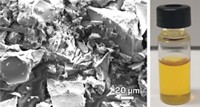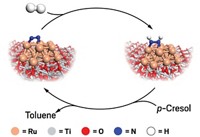Advertisement
Grab your lab coat. Let's get started
Welcome!
Welcome!
Create an account below to get 6 C&EN articles per month, receive newsletters and more - all free.
It seems this is your first time logging in online. Please enter the following information to continue.
As an ACS member you automatically get access to this site. All we need is few more details to create your reading experience.
Not you? Sign in with a different account.
Not you? Sign in with a different account.
ERROR 1
ERROR 1
ERROR 2
ERROR 2
ERROR 2
ERROR 2
ERROR 2
Password and Confirm password must match.
If you have an ACS member number, please enter it here so we can link this account to your membership. (optional)
ERROR 2
ACS values your privacy. By submitting your information, you are gaining access to C&EN and subscribing to our weekly newsletter. We use the information you provide to make your reading experience better, and we will never sell your data to third party members.
Synthesis
Methane Yields To Supercritical CO2
Carbon dioxide solvent, coupled with a silver catalyst, provides the right conditions for a successful C–H functionalization
by Carmen Drahl
May 16, 2011
| A version of this story appeared in
Volume 89, Issue 20
Methane is a molecule that rarely bows to chemists’ will, but researchers in Spain and France have coaxed it to do their bidding by using a silver catalyst and supercritical carbon dioxide solvent (Science, DOI: 10.1126/science.1204131). Few successful functionalizations of methane have been reported, so Gregorio Asensio of Spain’s University of Valencia, Michel Etienne of France’s University of Toulouse, Pedro J. Pérez of Spain’s University of Huelva, and colleagues decided to apply their electron-poor silver catalysts to the problem. Designed with heavily halogenated versions of so-called scorpionate ligands, which grip silver like a scorpion’s pincers, the catalysts were known to insert carbenes into relatively inert alkane C–H bonds. At first, however, the chemistry was problematic for methane because of side reactions and solubility issues. The researchers solved the problems by switching their solvent to supercritical CO2, which doesn’t react with intermediates and is miscible with methane. They show that a carbene generated from ethyl diazoacetate inserts into a methane C–H bond to make a new C–C bond, forming ethyl propionate, a chemical commonly used in the food and flavor industry, albeit in only 19% yield.




Join the conversation
Contact the reporter
Submit a Letter to the Editor for publication
Engage with us on Twitter